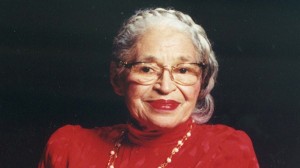Sixty years ago today, a 42-year-old woman became an American hero, an icon.
She might not have known at the moment of her heroic act that’s how she’d be remembered, but that’s what happened.
Rosa Parks was riding on a public bus in Montgomery, Ala. The bus was crowded and Parks was sitting while some passengers were standing. One of them told the bus driver to order Parks to stand up, to give her eat to him. She refused.
Parks was African-American; the passenger who demanded her seat was a white male. One did do such things in Montgomery, Ala., in 1955.
Parks was arrested, booked into jail.
At that moment a middle-age woman took her place among the legions of Americans who fought for equal rights for all citizens.
She would lead a bus boycott of the Montgomery transit system. Parks would become the face of bravery in the fight against racial discrimination.
She had grown tired, she said, of “giving in.”
On that day in a capital city of one Dixie’s states, she didn’t give in. Six decades later, the nation still salutes her bravery.
Rosa Parks wasn’t a gifted orator. One didn’t hear her make compelling speeches before monstrous crowds, a la Martin Luther King Jr. No, all she had to do was simply be there.
Parks made an appearance in Amarillo; I believe it was the late 1990s. My wife and I felt compelled to see and hear her. The meeting room at the Civic Center was packed.
Rosa Parks was introduced. She strode to the microphone. Parks said some truly forgettable things and then sat down. It didn’t matter one single bit that Parks didn’t stir our souls. Just seeing her — being in the same room with her — was enough for any of us present that day.
Parks died in 2005. Her courage will live forever.
